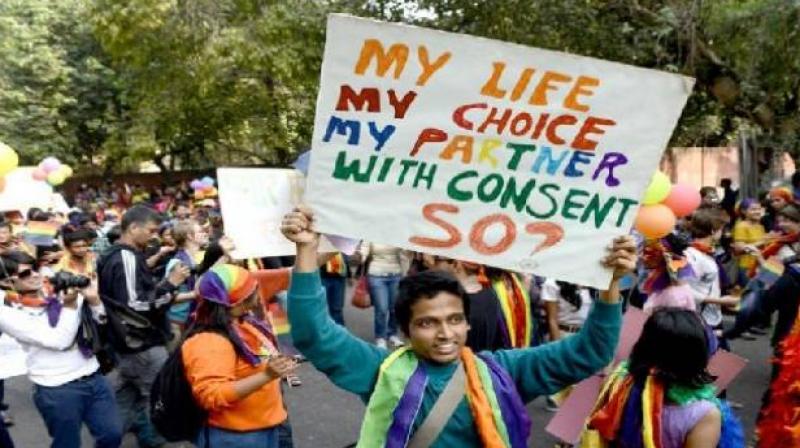Will examine correctness of 2013 verdict on gay sex, says SC
Senior advocate Mukul Rohatgi, appearing for one of the petitioners, said: 'Section 377 violates one's human rights.'

New Delhi: The Supreme Court on Tuesday indicated that it was open to examine the correctness of the 2013 verdict upholding IPC Section 377 that criminalises consensual gay sex.
At the outset, a Constitution Bench comprising Chief Justice Dipak Misra and Justices Rohinton Nariman, A M Kanwilkar, D Y Chandrachud and Indu Malhotra observed that it will examine whether the fundamental right to life includes ‘right to sexual freedom’ particularly after the nine-judge bench ruling that ‘right to privacy’ is a fundamental right.
Hearing began on Tuesday on a batch of petitions seeking a declaration that Section 377 is unconstitutional as it makes gay sex as carnal intercourse against the order of nature and provides for a punishment of up to life. However, such punishments are very rare as no such case is being prosecuted effectively.
The CJI told senior counsel Mukul Rohatgi, who appeared for Navtej Singh Johar that the principal question to be addressed by the court is the correctness of 2013 verdict in Koushal case. It affects the basic constitutional and human rights of a large section of society, called the sexual minority, the CJI added.
Rohatgi argued that the law that criminalises consensual gay sex is against the fundamental rights of Indians and societal perception that it is against the law of nature cannot be an excuse for it. He said that all males, as a class and all females, as a class do not have the same sexual orientation i.e. being attracted to the opposite sex.
Counsel said that such individuals are called gay men / lesbian women / bisexual persons. Such orientation is not acquired by way of choice and is genetic. Typically a person becomes aware of such orientation at adolescence. Sexual orientation is immutable and not a medical condition to be “cured”.
Rohatgi added that such individuals (sexual minorities in society) need protection, more so than those having the more common orientation (heterosexual), to achieve their full potential, to live freely, without fear, apprehension or trepidation and not be discriminated against by the society, in the light of ‘right to privacy’ verdict.
He said individuals belonging to this group suffer discrimination – open, insidious and invidious – throughout their lives, whether it be in school, college, employment (under the State or in private quarters) and even within their family. This is principally because of the existence of IPC Section 377 on the statute book for more than the past 150 years, which is a remnant of Victorian morality.
He further said constitutional morality has to overtake societal perception. “Don’t blame the society because we all have grown up with this provision in the statute.” Observing that societal morality changes from age to age, he said the provision should go out of the statute book.
A two-judge bench in 2013 had overturned a judgment of a three-judge bench of the Delhi High Court, which had earlier taken a contrary view and had decriminalized the Section 377 IPC provision.
Section 377 IPC says “Whoever voluntarily has carnal intercourse against the order of nature with man, woman or animal, shall be punished with (imprisonment for life), or with imprisonment of either description for a term which may extend to ten years, and shall also be liable for fine.”
Arguing for the petitioners Keshav Puri, senior counsel Arvind P Datar told the bench that gay activists in the country live under constant fear of persecution and said a nine-judge bench in the right to privacy matter had also heavily commented upon the rights of sexual orientation of the LGBT (lesbians, gay, bisexuals and transgenders) rights.
He pointed out that a provision does not become unconstitutional because there can be abuse of the same. He said social morality also changes from age to age. The law copes with life and accordingly change takes place. The morality that public perceives, the Constitution may not conceive of. The individual autonomy and also individual orientation cannot be atrophied unless the restriction is regarded as reasonable to yield to the morality of the Constitution.
Datar added “If sexual orientation is a “natural right” as held in right to privacy judgment then there is no intelligible differentia between opposite sex and same-sex couples. Justice Chandrachud intervened and observed, “in Hadiya (Kerala love jihad judgment), we recognised the right to choose a partner to come under Article 21 (right to life). When you accept this proposition, then right to choose a partner of same sex is also a right under Article 21 of the Constitution.
Arguments will continue on Wednesday.

